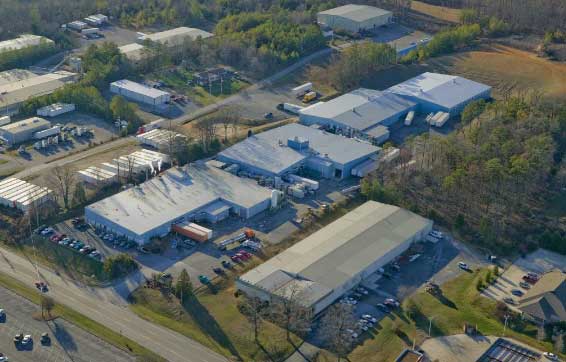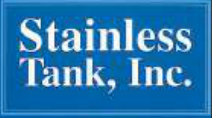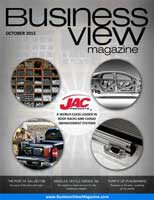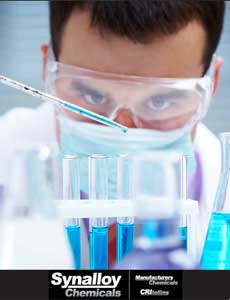Chemical company adapts to an ever-changing market
Synalloy Corporation, a publicly-traded company on the NASDAQ, is headquartered in Spartanburg, South Carolina. A growth-oriented company that has been in business since 1945, Synalloy engages in a number of diverse business activities including the production of stainless steel pipe, fiberglass and steel storage tanks, and specialty chemicals. Synalloy is comprised of two distinct business segments – Metals and Chemicals. The Synalloy Chemicals Segment, itself, is comprised of two business units: Manufacturers Chemicals, and CRI Tolling.
Greg Gibson is the General Manager of Synalloy Chemicals, having come to the company in 2005, with a background in the pharmaceutical and chemical industries. He narrates the story of each of his company’s units, how they came to be, and how each one operates within the Synalloy family:
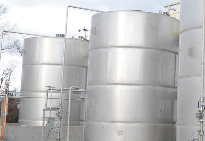 “Manufacturers Chemicals was founded in 1919 as a spin-off of Hardwick Woolen Mills’ chemical division. Manufacturers Chemicals was purchased by Synalloy in 1996. Originally, it was established to service the textile industry, but today the Company’s products find their way into 17 distinct markets, primarily: Paper, Carpet, Textile, Industrial Chemicals, Metal Working, HI&I (Household, Industrial & Institutional chemicals), Petroleum and Mining, Latex Additives, Automotive, Cosmetics, and Agriculture. It manufactures lubricants, surfactants, defoamers, reaction intermediaries, and sulfated fats and oils.”
“Manufacturers Chemicals was founded in 1919 as a spin-off of Hardwick Woolen Mills’ chemical division. Manufacturers Chemicals was purchased by Synalloy in 1996. Originally, it was established to service the textile industry, but today the Company’s products find their way into 17 distinct markets, primarily: Paper, Carpet, Textile, Industrial Chemicals, Metal Working, HI&I (Household, Industrial & Institutional chemicals), Petroleum and Mining, Latex Additives, Automotive, Cosmetics, and Agriculture. It manufactures lubricants, surfactants, defoamers, reaction intermediaries, and sulfated fats and oils.”
“CRI Tolling was established in 1993, primarily to service the colorant markets in the textile and paper industries. But today the company’s products find their way into 12 distinct markets, principally: Agrochemical, Automotive, Urethane, Water Treatment, Anti-microbial, Coatings and Lubricants, and Hydraulics. Synalloy purchased CRI Tolling in August of 2013 to fulfill a key strategic initiative of our Specialty Chemicals Segment which was to acquire or build a second production facility.”
Gibson continues: “Manufacturers Chemicals had experienced continuous growth over the past five years and we had many opportunities to further penetrate existing markets, as well as develop new ones, including those in the energy industry. Production capacity at our Cleveland, Tennessee facility was getting tight and the addition of the CRI facility provided us ample room to grow. Our two-site strategy allows us duplicate critical production capabilities and placement of large-volume business near our customer base.”
Manufacturers Chemical is located on a ten-acre industrial site in Cleveland, Tennessee, some 32 miles northeast of Chattanooga. Its 75 employees work in a 125,000 square-foot facility which has 55,000 sq. ft. of production floor space and 66,000 sq. ft. of warehouse space and offices. 4000 square feet are dedicated to research, design, development, and quality assurance laboratories, including sample, pilot plant, and instrumentation labs offering the latest in technical equipment.
The annual capacity at Cleveland is 150 million pounds. The production area is equipped with twenty-two mixing vessels which range in size from 30 gallon to 8,250 gallons; six stainless-steel, hot oil reactors, which range in size from 600 to 8,000 gallons; and one 2,700 gallon, stainless-steel, steam-fired reactor. All vessels use stainless piping throughout and the reactors have condensers, separators, nitrogen sparge, and full vacuum or pressure capabilities.
The CRI facility is located in Fountain Inn, South Carolina, near Greenville. Its 20-acre site is slightly larger than its sister plant’s footprint in Tennessee, and at 150,000 square feet, it’s also a bit bigger. But its layout and capabilities are very similar, including 4,000 sq. ft. of research, design, development, and quality assurance laboratories. The annual capacity CRI is 175 million pounds. The production area is equipped with forty mixing vessels which range in size from 200 gallon to 5,000 gallons; and four stainless-steel, hot oil reactors which range in size from 3000 to 8,000 gallons.
In addition to its state-of-the-art fabrication capabilities, Gibson asserts that being flexible, proactive, and responsive to market changes and demands is a hallmark of Synalloy Chemicals. “For example,” he says, “during the last three years we have progressively transformed our company focus. Early on, both our companies were heavy in the textile and carpet industries. As that business left overseas, we ended up having excess capacity and started taking on some tolling projects, and now, whereas early on, we were predominantly selling to end users, now end-user sales are only about 10 percent of our total portfolio.”
In the chemical sector, tolling is an arrangement in 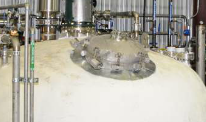 which a company with specialized equipment, such as Synalloy, agrees to processes raw materials or semifinished goods for another company. Gibson explains that, today, his company is “basically a sub-contractor for chemical companies that either lack the capital, or are more service-oriented, and don’t want to get into the manufacturing or production side of things. So, typically what we do is work alongside those organizations. We have our own chemists, as well, so we can create and develop formulas based on their information about the end user. Some bigger companies have their own formulations and do their own work and they provide us the formula. We will custom manufacture the product, whether they or we created it, and we will label it with their label and ship it out of our facility.”
which a company with specialized equipment, such as Synalloy, agrees to processes raw materials or semifinished goods for another company. Gibson explains that, today, his company is “basically a sub-contractor for chemical companies that either lack the capital, or are more service-oriented, and don’t want to get into the manufacturing or production side of things. So, typically what we do is work alongside those organizations. We have our own chemists, as well, so we can create and develop formulas based on their information about the end user. Some bigger companies have their own formulations and do their own work and they provide us the formula. We will custom manufacture the product, whether they or we created it, and we will label it with their label and ship it out of our facility.”
When asked what differentiates Synalloy from its competitors, Gibson is quick to reply: “Our people. Certainly, any organization is only as good as its people. We pride ourselves in always maintaining the best employees in our sales, customer service, and design teams. That’s first and foremost. And even though we are a publicly-traded company with a conglomerate of different companies across numerous states, we really are a family. Secondly, we have a unique ability to provide very quick and responsive turnaround. Our laboratory equipment allows us to perform required testing in a highly efficient manner and our ISO 9001 certification guarantees consistency for our customers.
“But ultimately, I think it’s our diversity. We have hot oil reactors, steam reactors, and mix vessels. So we have a unique ability to create some unique products – whether its chemical intermediates or just simple blends based on the equipment that we have here in varying sizes. If a customer calls us and wants a bulk tanker wagon of material, we have the vessel for that. If they want a couple of drums or two totes, we have vessels that will accommodate that, as well. We are able to optimize our production process and efficiency based on the order size. Other companies don’t have those same capabilities.”
Synalloy makes continual capital investments into its chemical operations – a testament to the parent company’s strategy of growing organically, as well as through acquisition. “We recently completed a $5 million expansion project at CRI Tolling to help increase our hot oil reactor capabilities at that site,” says Gibson. “We also have started a new $1.2 million project at Manufacturers Chemicals to increase our hot oil reactor capabilities at that site, which we will complete in 2016.”
Gibson also remarks that environmental sustainability will be a top priority at Synalloy Chemicals: “We continue to invest numerous resources, time, and capital to lead in the area of environmental sustainability because we are in a position where we can make a difference. So, it will be a continual process going forward. Recently, we partnered with a company to provide a unique green molecule to the urethane market to help increase environmental sustainability across multiple markets. This was a primary reason for our recent expansion at CRI Tolling.”
As Synalloy Chemicals looks to the future, Gibson stresses that the company will always be learning, growing, and improving all of its custom chemical fabrication standards, while its experienced sales and marketing departments will continue to identify key organic growth markets that fit its niche products and capabilities. “Success doesn’t just happen,” he asserts. “You have to plan for it and then execute the plan. Strategically, we are better positioned for success in 2015 than ever before. We have identified specific markets and we are aggressively pursuing opportunities that will sustain sales and profits for years to come. And ultimately, that is something that we have to look at, day in and day out, year in and year out; that really never changes for us. Because our product line is always changing, our customers are changing, and certainly, the market demands that we be able to quickly adapt.”
AT A GLANCE
WHO: Synalloy Chemicals LLC
WHAT: Manufacturer of specialty chemicals
WHERE: Fountain Inn, South Carolina and Cleveland, Tennessee
WEBSITE: www.manufacturerschemicals.com
